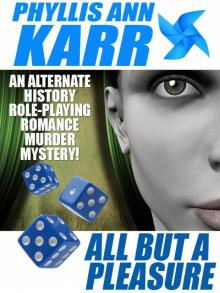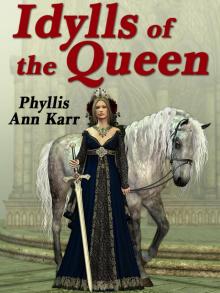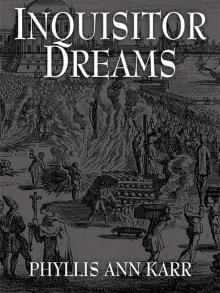- Home
- Phyllis Ann Karr
All But a Pleasure
All But a Pleasure Read online
COPYRIGHT INFORMATION
Copyright © 2016 by Phyllis Ann Karr.
All rights reserved.
Published by Wildside Press LLC.
www.wildsidebooks.com
ALSO BY PHYLLIS ANN KARR
At Amberleaf Fair
Frostflower and Thorn
Frostflower and Windbourne
The Gallows in the Greenwood
The Idylls of the Queen
Inquisitor Dreams
OPENING QUOTATION
“The pain that is all but a pleasure will change
For the pleasure that’s all but pain…”
—Gilbert & Sullivan, Patience, Act I Finale
CHAPTER 1
Sunday, September 17
“With all due reverence, honored Rulemaster,” Corwin protested, “the Spanish version of the Inquisition did not make a habit of burning witches.”
“Don Serafino,” said Rulemaster Sam Imani, the portly and genial host of the Sunday rolegame parties, addressing Corwin by the name of his persona, “we’re playing this game by the Lurid Legend, not the historical record.”
“And I approve the Lurid Legend with the warmest and most pious enthusiasm, on the whole, at least as utilized in the present ludification. I strove merely to point out why Don Serafino would protest subjecting to even so much as arrest…” Corwin’s deep brown eyes turned for an instant toward Angela…“this valuable and responsible herbalist who serves her underpopulated hamlet as its sole midwife and, in effect, physician.”
“You’ve just lost even more points with your fellow inquisitors, Don Serafino,” said Julie Whitcomb, a.k.a. Fray Paulo, gracefully patting the colorful tattoo that peeked out above the scoop neckline of her long, blood-red gown. She went on, “We know how many secret heretics hide out as inquisitors. Rulemaster, roll the die and let’s see how many points Don Serafino has lost this time.”
“Oh, go ahead and burn Old Agnes!” Angela stood up. “I’d just as soon bow out of this game anyway. I’m going to see if I can’t start up a Raggedy Ann scenario with some of the others.”
“Raggedy Ann?” Corwin inquired, cocking one of his black eyebrows at her.
“Yes, Raggedy Ann! And when your fellow inquisitors have finished arresting and torturing and burning you, you can come over to my game and be Raggedy Andy!”
“That might prove very restful,” said Corwin. “Take good care of your candy heart, Raggedy Ann.”
She thought she felt his gaze following her as she bounced through Sam Imani’s big living room. At the door to the lounge, she paused and glanced back. She’d been right—he was still gazing after her—though as soon as she caught him doing it, he turned back at once to his fellow gamers in the Spanish Inquisition scenario.
Why had she even joined the silly Inquisition game in the first place? Partly, she supposed, from curiosity; partly because her other choices at the very beginning of the afternoon had been The Last Great War in the den and Gojira Attacks in the dining room; and partly because she and Corwin had been childhood friends who kept up a correspondence all through college and were finally seeing each other again in person after those five years two thousand miles apart in different sections of the Reformed States of America.
Well. Corwin Davison had always tended a little this way. Ever since at least fifth grade, his favorite author had been Edgar Allan Poe, from whom he had taken the sort of nick-surname so many people used. Of course, most children had a strong morbid streak, and their own neighborhood group, Corwin’s and Angela’s, used to play Feds and Klingons, Pollies and Robbers, and Savage Initiation Rites like any other bunch of kids. Only, Angela had outgrown that kind of thing. From what she’d seen of him so far, she didn’t think Corwin ever had. If anything, he’d grown worse…well, more emphatic about it, anyway.
She’d been forced to grow up all at once, start looking in earnest for her adult self when her mother died of Anne Sutler’s Disease the summer after Angela’s graduation from high school. Angela had already been accepted at the University of Minnemagantic, but her arrival there had had to be delayed for Mommy’s funeral. At the university, she found she either had to cultivate a sunny outlook, or sink into a suicidal depression. Luckily for her, her faculty advisor had been Professor of Music Clement Czarny, and if a vampire—whether he really was one or only thought he was—could live so heroically decent a life, surely Angela Garvey could grow her optimistic side to full flower.
As soon as Angela was safe at college, her father and younger sibs moved down to Miami, which was why she and Corwin had never managed to see each other again in their old home town during vacations. And, apparently, letters had not been enough to keep her aware of what was going on or—maybe—not going on inside his character. How could he still be enjoying such a totally repulsive rolegame as Spanish Inquisition?
And yet, otherwise, he seemed so gentle, so considerate, so much her old friend. Even, in some ways, improved, as people ought to improve when they grew up… With a puzzled shake of her blond head, Angela pushed into the lounge and started trying to interest players who had already been knocked like her out of their earlier games in a safe and pleasant Raggedy Ann scenario.
The quieter scenarios should be starting later in the afternoon anyway, by what Corwin had told her. And, to her delight, four of the five gamers in the lounge applauded her idea, including Hank Algood, who knew even more than she did about Johnny Gruelle’s world and undertook to guide her proposed scenario from the rather unexpected role—for Rulemaster—of the Camel with the Wrinkled Knees. They decided on the library for their playing area.
* * * *
Across town, Detective Sergeant Rosemary Lestrade and her junior partner Detective Dave Clayton were staring down at a stark naked corpse.
Murder wasn’t run-of-the-mill in a town of 35,000 in the safe breadbasket of the R.S.A., but this young man had obviously been murdered.
Dave, who was only twenty-eight, had already gone aside to heave and come back again, reluctantly but with his mouth wiped. Officer Kim Little Bird had probably done the same earlier—she and her senior partner, Officer Stan Vergucchi, had been the first pollies called to the scene. Stan was on the edge of retirement age and might have reasonably experienced insides.
At forty-four, Rosemary Lestrade had seen murder victims before. Enough to harden her stomach. Luckily, as far as that word ever applied in murder cases, the cold water had kept the corpse reasonably fresh, or even stronger police insides than hers might have turned. Especially at what had been done to the genitals. And other parts of the body.
Officer Little Bird said, “What a waste!”
“M.E.’s on his way,” Lestrade remarked. “For whatever the old floater’s opinion might be worth.”
“What a waste!” Officer Little Bird repeated.
Yes. Someone Kim Little Bird might have enjoyed dating, Lestrade thought wryly, if she’d met him in time. Someone whose life she might’ve changed enough to keep it from ending in murder.
“They didn’t have to torture him to death, on top of it!” Clayton burst out. “Bastards!”
“Watch your language, Detective. You can probably find a stronger word than ‘bastards.’ And I’m not convinced this was a torture murder. More likely post-mortem, I’d guess. Water’s rinsed away any blood that could’ve made it obvious, but that doesn’t look like an agonized facial expression to me. More like your plain, ordinary surprise at being unexpectedly dead.”
“Devils?” Clayton suggested.
Lestrade shook her head. “Stronger than that. It’s always beaten me why your Christian devils would even
need to bother corrupting humanity. We do pretty well—if you want to call it that—all on our own. We humans could probably corrupt the devils of your hell. Even in this ‘safe and sane’ age of the R.S.A.”
“What’s that?” Clayton pointed. “There…near the hollow beneath his right collarbone.”
Lestrade stooped for a closer inspection. “Good eyes, Dave!… Looks like a tattoo of some kind… Whirligig? All blue, I think… Maybe one of those stamped tattoos popular with semi-secret groups like fraternal lodges and rolegame clubs.”
“Some kind of initiation that went too far? Bloody…bloody motherprickers!”
“Getting a little warmer with that one.” Lestrade straightened up and wiped her hands on her trousers. Not that she had touched any of the evidence, but that she felt dirty just being this close to it. “Better leave all this alone until the M.E. gets here.” For what he’s worth, she repeated to herself.
Rolegamers in futuristic and science-fiction scenarios, and maybe forensic specialists in some of the “alternate worlds” a few bona-fide scientists thought existed, might have wonderful machinery for pinpointing things like genetic evidence, exact nanosecond of death, and so on. Here and now in the real world, a small town of 35,000 budgeted minimal funds for its police department. She and Clayton were its only two detective grades. As for their medical examiner, Doc Grumeister might have an office in the station where he was on duty “ten to four,”—a dying idiom now the whole country had been on the twenty-four hour clock about twenty-four years; but Doc Grumeister was a joke, just marking time until retirement, and probably not that competent even in the forensics of the year Rosemary Lestrade was born.
Baptized Rosemary Lozinski—with herbs and flower petals in a Wiccan ceremony—she had grown into a tall, roughhewn-looking woman who entered law enforcement less to catch bad guys than to make sure no good guys got caught by mistake. Back in second grade, she had been punished herself for something she hadn’t done, and the experience left its mark. If catching the real bad guys came along with clearing the innocent suspects—and sometimes you had to catch the bad guys in order to clear the good ones—that was just an added bonus. Especially if and when the cases involved crimes likely to be repeated. Which, up to now in this town, had mainly included petty robbery and passing bad checks. Two cases of vandalism and one of arson—more than bad enough. She hoped that what she stood looking down at today wasn’t the first in a string of serial killings like the ones that, once solved, had made up her mind to leave Chicago, Illinois for Forest Green, Indiana.
Doc Grumeister tottered in at last, fumbled the corpse around for a few minutes, and ruled death by violence. No surprise. Whether the genital mess, burn marks, splinted finger- and toenails, lines of criss-cross cutmarks, and stamped tattoo had come before or after death, he couldn’t say and showed no real interest in trying to find out, not after the unknown number of hours the body had spent in the Vigo River. He simply ruled—also no surprise—that death had likelier resulted from torture than from drowning.
* * * *
Deep in the Deep, Deep Woods, halfway to the hot dog bush on the edge of the Lemonade Lake, the Raggedy Ann gamers in the library started hearing loud screams from the direction of the living room. One, then another…a short pause, then three more…another pause, and then one last one that sounded less like a scream than a blood-curdling shriek.
At the first scream Angela started up, recognizing Corwin’s voice. Then—“It’s just that stupid Spanish Inquisition game,” she told the four people in easy chairs around her, as she sat herself back down on the loveseat and returned to her title role in the game.
Two or three minutes after the shriek, Corwin strolled into the library, brushing invisible dust off his black lounge suit. “That was invigorating,” he remarked. “A genuinely cathartic experience.”
“Lawsy me!” Pearl Mitsu spoke more or less the way she conceived her character—Beloved Belindy—ought to speak, whether Johnny Gruelle had written it that way or not. “Was that you’m we done just heard a-screamin’ an’ a-caterwaulin’ fit to bust our buttons?”
“As unmusical as that?” He sat down on the loveseat beside Angela and stretched his arms along its back. “Yea, verily, ’twas I. They found me out and administered certain exquisite devices held in especial reserve for those who fall from their own exalted ranks. Then, for the climax, they naturally burned me alive at the stake. Thus expediting me, by their own lights, straight from a terrestrial into an infernal holocaust. I, of course, enjoy a variant eschatological interpretation, my secret heresy having been that rather arrogant species of universalism termed apokatastasis. Do I make myself clear?”
“Oh, yes,” Angela replied. “To about ten percent of the members of Mind-sa.”
“You sounded like they were really doing something to you,” said Gerry Wu, who was playing Policeman Percy.
“I rejoice—if that is an appropriate idiom—in a singularly vivid imagination. I also strongly suspect,” Corwin mused on, “that every last inquisitor in that game is secretly either heretic, morisco, or judaizer. It was simply my fortune to be found out first. I wonder why?”
Angela glanced at his nearer arm. If he dropped it just a few inches, he could have it around her shoulders. She decided to leave it where it was, for now. “Because you wanted to be found out,” she told him. “You were teasing them all along to find you out. Trying to get all the non-inquisitor players off like that. And never accused even one of your fellow inquisitors, I’ll bet.”
“I was biding my time while gathering, sifting, and collating evidence. Alas, I bided it a bit too long. Does the role of Raggedy Andy remain open?”
“We’ve been saving it just for you,” Hank replied. “At our dear Raggedy Ann’s special request.”
“Ah! This may perhaps be the place for me to interject that I have never been entirely clear as to the exact relationship between the beloved Raggedies. Are they sweethearts or spouses or —”
“Sister and brother,” Angela said firmly.
“Rulemaster?” Corwin looked around to see who the Rulemaster might be. His glance settled on Hank, probably because Hank had been the one who told him they were saving Raggedy Andy for him.
“Your sister’s right, Andy,” Hank confirmed. “She’s a bright girl, but even if she wasn’t, it doesn’t take genius level to know one’s own brother.”
“Brother,” Corwin repeated, sounding a little disappointed. “Siblings.” He folded his arms. “Very well, Rulemaster, if you will graciously brief me on the identities and whereabouts of our congenial cameraderie in this pastoral scenario?”
“First, Thesaurus Kid,” Hank ruled, “cut the sesquipedalian gymnastics. They don’t fit Raggedy Andy.”
Corwin blinked, and nodded. “Hard, but I’ll try.”
As the evening wore on, Angela had to confess to herself that he was fitting into her scenario quite a bit better than she had fit into his. He didn’t even slip into complicated vocabulary more than half a dozen times.
Of course, Spanish Inquisition hadn’t exactly been “his” scenario. It had been the one Julie Whitcomb and Sam Imani and their crowd were inviting people into at the start of the afternoon. True, Corwin had fairly jumped at the chance.
* * * *
As more and more players got killed or otherwise retired from their original games, the players regrouped into four wind-down scenarios in all: besides Raggedy Ann in the library, there were Dragon Mountain in the conservatory, Wonder-Glass in the dining room; and Roly-Polies and Fence Rails—based on the French children’s classic Patapoufs et Filifers—in the billiards room.
At length only four players remained in Sam Imani’s living room: Imani himself, Julie Whitcomb, lean Paul Osaka, and Curly Friedman, who was so hefty she could pull off a convincing male interpretation if and when she chose, and whose rich, coffee-colored skin was dark enough to have let h
er pass for an ethnic pureblood if only her hair had been woolly instead of long and straight. “Curly” was one of those ironic nicknames meaning the opposite.
All four of them bore a tattoo like a whirligig of tiny lightning bolts stamped somewhere or other on their bodies. Julie’s was near the hollow beneath her right collarbone, Sam’s was just below his navel, Paul’s on his inner right thigh, Curly’s on the heel of her left foot.
Sam, Julie, and Paul had all played inquisitors, Curly the last ordinary Spaniard to have spent the evening wriggling out of their clutches. But after everyone else had been burned at the stake, these last four, instead of finishing the game to a single winner, drew together with a final glance around the otherwise unpopulated living room, and began to confer in low voices.
“Well, what does everybody think?” Sam began. “Any potentials for Julie’s replacement?”
Julie patted her whirligig. “I believe Corwin Poe looks promising. I’ve had my eye on him most of the summer.”
Paul and Curly nodded. “Good,” Sam said, writing in a little blue notebook. “I like him, too. Anybody else? Let’s see. We had Trudy Huerth…Hobart McGruff…Carmine Raincloud Jones…”
“Carmine might work,” Paul tapped his nose, a habit he had that looked like he was trying to straighten the crook where it had once been broken. “He’s got Cinnamon blood. Might know something about the Sun Dance.”
“Yes, the way each of us is fluent in our various ancestral languages,” Julie observed satirically.
“The Sun Dance was Mandan and Sioux, I think,” said Curly. “Carmine’s ancestry was Hopi, wasn’t it? Tamer kind of dancing.”
“Maybe he’s got a little Aztec or Mayan blood, too,” Sam suggested. “They could be fierce.”
“Carmine Jones,” Julie declared, “is more enthusiastic about the musical stage than his ancestral heritage, whatever the tribe. I’d say he joined our scenario chiefly because the Spanish Inquisition figures in a few standard-repertory operas, and the other two serious scenarios didn’t. I vote no on Jones.”

 The Gallows in the Greenwood
The Gallows in the Greenwood At Amberleaf Fair
At Amberleaf Fair Frostflower and Thorn
Frostflower and Thorn The Fanciers & Realizers MEGAPACK
The Fanciers & Realizers MEGAPACK All But a Pleasure
All But a Pleasure The Idylls of the Queen
The Idylls of the Queen Frostflower and Windbourne (Frostflower & Thorn)
Frostflower and Windbourne (Frostflower & Thorn) Inquisitor Dreams
Inquisitor Dreams